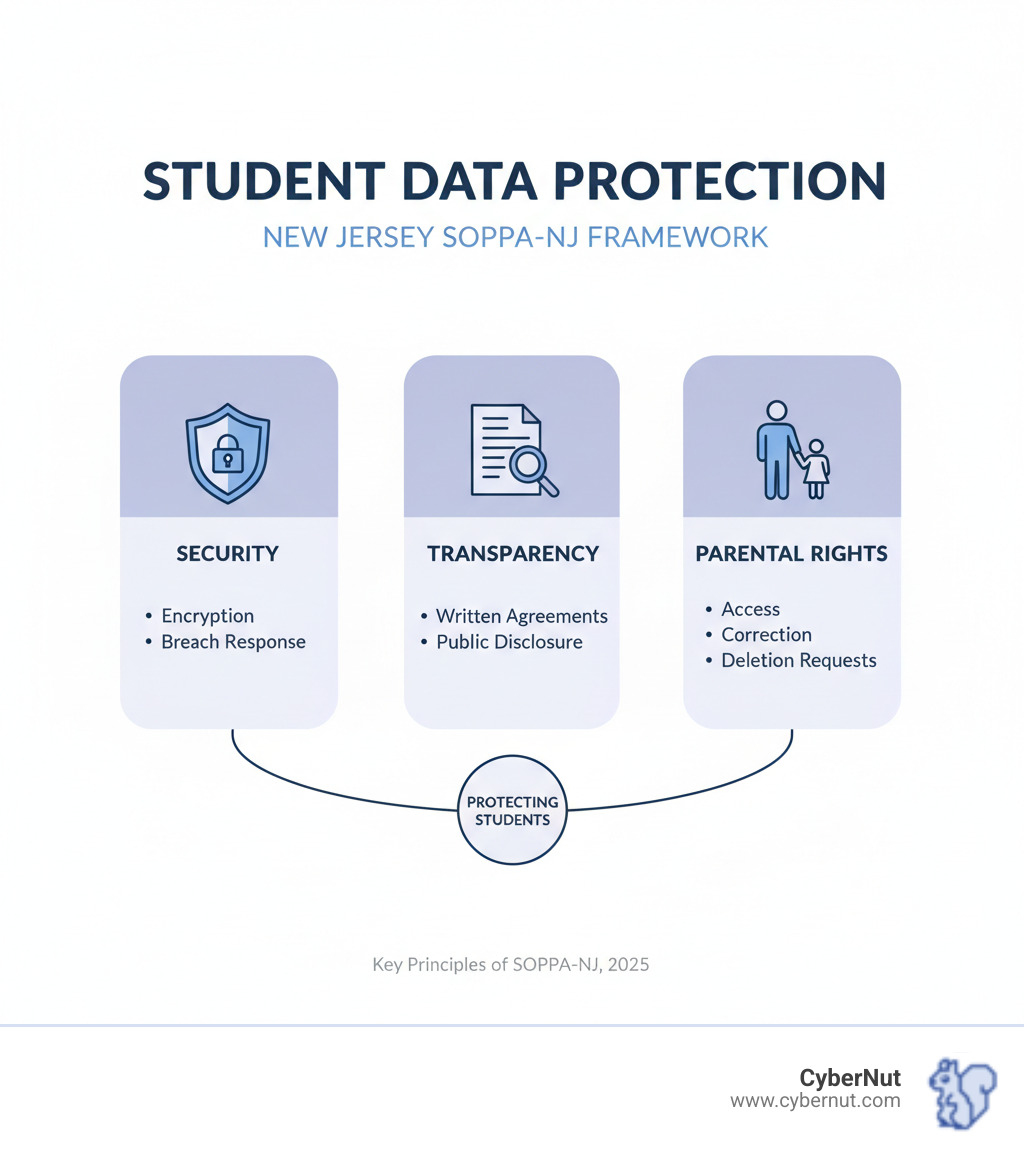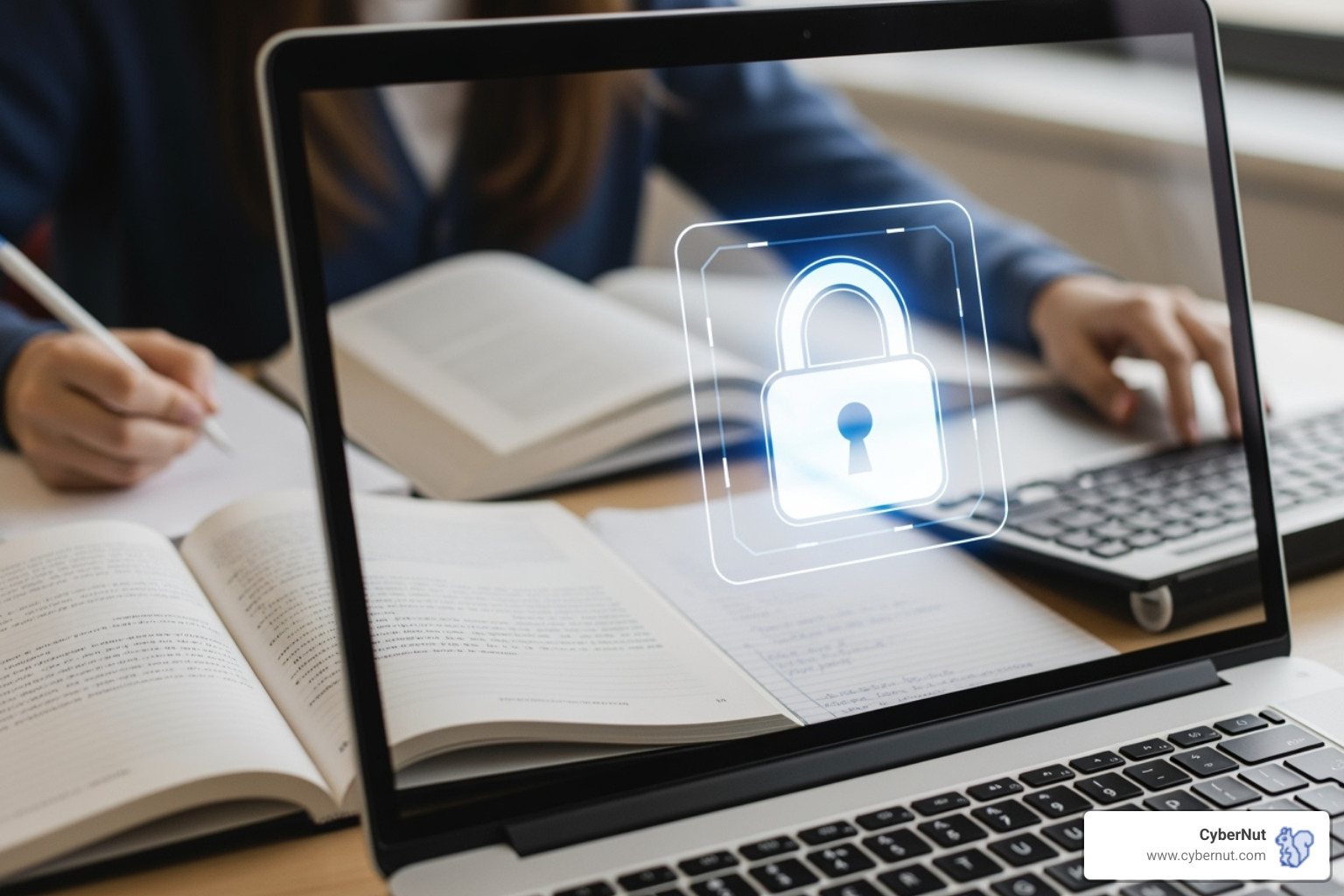
Oliver Page
Case study
October 6, 2025

As K-12 education becomes increasingly digital, protecting student data is paramount. Every learning app and online platform collects student information, creating risks of misuse or data breaches. New Jersey has responded by building one of the nation's most robust student privacy frameworks.
What to Know About New Jersey's Student Online Privacy Protection Act (SOPPA-NJ) is that it's a key part of a larger legal shield. This shield includes Assembly Bill A4978 (SOPPA-NJ), the broader New Jersey Data Protection Act (NJDPA), and federal laws like FERPA. For school IT directors, understanding these laws is essential for protecting students and ensuring compliance.
Quick Overview: Key Points for K-12 IT Directors
This guide breaks down this legal landscape into actionable information, explaining vendor responsibilities, district obligations, and how to build a culture of data privacy.

Terms related to What to Know About New Jersey’s Student Online Privacy Protection Act (SOPPA-NJ):
What to Know About New Jersey's Student Online Privacy Protection Act (SOPPA-NJ) starts with Assembly Bill A4978. This law sets clear rules for how educational technology companies can use student data, based on a simple principle: information collected for learning should only be used for learning.
As detailed in All About NJ A4978: The Student Data Privacy Law You Shouldn't Ignore, the law defines an "operator" as any entity running an online service designed and primarily used for K-12 school purposes. This broad definition covers learning management systems, reading programs, and digital homework platforms.
The covered information includes any student personally identifiable information (PII) that can be traced back to a specific student. This includes names, addresses, academic records, health information, and even browsing patterns within educational apps. For school districts, this means evaluating ed-tech vendors on their privacy commitments is as important as comparing features and price.

SOPPA-NJ establishes four core prohibitions to keep student data focused on education, not commercial profit:
These prohibitions ensure that when schools adopt new technology, they aren't inadvertently inviting data mining operations into the classroom.
SOPPA-NJ also mandates a complete lifecycle approach to data protection, from creation to destruction.
Operators must implement reasonable security measures, such as encryption, strong authentication, and firewalls, to protect student data. In the event of a data breach, the law requires timely notification to school officials so they can respond quickly.
Data destruction is also required. When a contract ends, operators must either return all student data to the district or permanently destroy it, preventing student information from lingering on third-party servers. Districts should require proof of destruction in their vendor agreements.
Finally, operators must facilitate parental access requests. While schools are the primary point of contact, vendors must be prepared to help parents review and correct their child's data, ensuring transparency and family control.
Protecting student data is a partnership between schools and technology providers. When both parties understand their roles, students benefit from innovative tools and strong privacy protections. This section details the responsibilities for each.
For ed-tech operators, What to Know About New Jersey's Student Online Privacy Protection Act (SOPPA-NJ) is that compliance is a legal requirement. The framework is designed to keep student data in service of education, not profit.
Key obligations for operators include:
School districts are the first line of defense for student data. This responsibility requires proactive management of technology partners.
Even with strong protections, breaches can occur. A swift and transparent response is critical.
A breach is any unauthorized acquisition or disclosure of student data. When a breach happens, the notification timeline is tight. Ed-tech operators must notify designated school officials promptly, often within 72 hours, so the district can activate its response plan.
Once notified, the school has an obligation to notify parents in clear, straightforward language. The notification should explain what happened, what data was affected, the response actions being taken, and steps parents can take to protect their children.
Both the operator and the school must cooperate with investigations and work to remedy the situation. A pre-existing Data Security and Privacy Plan with a detailed incident response strategy is essential for managing these events effectively.
What to Know About New Jersey's Student Online Privacy Protection Act (SOPPA-NJ) is that it doesn't operate in a vacuum. It works alongside other state and federal laws—like the New Jersey Data Protection Act (NJDPA), FERPA, and OPRA, to create a multi-layered shield for student data. Understanding how these laws interact is key to comprehensive protection.
Effective January 15, 2025, the New Jersey Data Protection Act (NJDPA) adds another powerful layer of privacy protection. While not specific to students, its broad scope covers many companies that handle student data.

Key NJDPA provisions impacting schools include:
While individuals can't sue directly, the NJ Attorney General has enforcement power.
The Family Educational Rights and Privacy Act (FERPA) is the federal foundation of student privacy, applying to nearly every school in the country. It protects personally identifiable information (PII) within education records—any record maintained by a school about a student.
The general rule of FERPA is that schools cannot disclose PII from education records without written parental consent. However, the "school official" exception allows schools to share data with third-party vendors performing an educational service, provided the school maintains control over the data and the vendor agrees not to re-disclose it.
Crucially, FERPA sets the floor, not the ceiling. State laws like SOPPA-NJ can add stronger protections. For example, while FERPA allows data sharing with vendors, SOPPA-NJ explicitly prohibits those vendors from using the data for targeted advertising, filling a critical gap.
New Jersey's Open Public Records Act (OPRA) balances government transparency with individual privacy. While it grants citizens access to public records, it includes specific exemptions that protect student records from public disclosure. This ensures that sensitive information like grades, health records, and disciplinary files remains confidential.
Recent revisions to OPRA, enacted in June 2024, further strengthen these protections by explicitly shielding personal information like email addresses and partial birth dates from disclosure. The revised law also requires schools to report cybersecurity incidents to the Attorney General's office, adding another layer of accountability.
OPRA acts as a gatekeeper, ensuring public transparency doesn't compromise student privacy. For more on this topic, explore What to Know About OPRA Exemptions: How New Jersey Protects Student Records.
Understanding privacy laws is the first step; putting them into practice is the next. This section provides actionable steps and resources for parents, students, and schools to become active participants in protecting student data.
Under What to Know About New Jersey's Student Online Privacy Protection Act (SOPPA-NJ) and related laws, parents and students have significant, enforceable rights over their data.
These rights empower families to manage how their children's information is used in the digital learning environment.
For schools, compliance is about building a sustainable culture of privacy. Here are key best practices:
Several state and federal agencies provide resources to help steer student privacy laws:
The digital age offers incredible learning opportunities, but it also brings a profound responsibility to protect our students' digital footprints. What to Know About New Jersey's Student Online Privacy Protection Act (SOPPA-NJ) is that it, along with the NJDPA and FERPA, creates a powerful, multi-layered shield around student data. These laws ensure that information collected for education is used for education and nothing else.
For New Jersey school districts, this legal framework demands proactive compliance. It requires vetting vendors, strengthening contracts, and implementing robust technical safeguards. Most importantly, it calls for building a district-wide culture of cybersecurity awareness, where every staff member and student understands their role in protecting sensitive information.
This cultural shift is critical because the human element is often the weakest link in security. A single click on a phishing email can bypass the strongest firewalls. At CyberNut, we specialize in strengthening that human element. Our automated, gamified micro-trainings are designed for busy K-12 staff, making cybersecurity awareness engaging and effective without adding to their workload.
To build a truly resilient defense, you must first understand your vulnerabilities. To assess your district's susceptibility to phishing attacks and get a clear picture of your current risk, request a phishing audit. This is the first step toward prioritizing your security improvements.
Building a cyber-secure school is about making consistent progress. New Jersey has provided the tools with SOPPA-NJ and NJDPA; now it's up to us to use them. For more information on creating a comprehensive cybersecurity program that protects your students and staff, visit our website. Together, we can ensure that innovation and privacy go hand in hand.

Oliver Page

Some more Insigths


Back